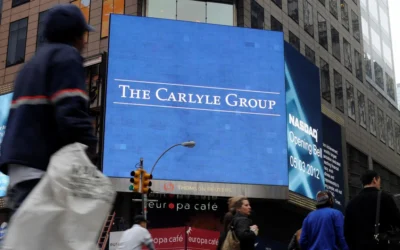Well, that was quite a week. And it looks like it’s going to be quite a year.
The new coronavirus that first appeared in China nearly four months ago is now officially a pandemic, and the US is finally beginning to grapple in earnest with what could be the nation’s most destructive public health crisis in more than a century. The stock market spent much of the week in freefall, giving up nearly three years’ worth of gains in the span of four days before a late Friday surge. Sports are essentially canceled. Tom Hanks is sick. Who knows what’s going on in the White House. And doctors and scientists are loudly sounding the alarm that things will likely get much worse before they get better.
It’s a mad world out there, which is one of 10 things you need to know from the past week:
1. A whirlwind week
It’s always a strange feeling to live through history. As cities across the US clamped down on group gatherings and the stock market experienced its worst day since 1987’s Black Monday, one part of me was extremely aware the events filling up my Twitter feed would be remembered for the rest of my life, and probably much longer. Another part was wondering whether I still had enough turkey in the fridge to make a sandwich. It’s a weird dissonance when world-historical events start overlapping with your lunch plans.
The week brought a ceaseless cascade of news. The entire nation of Italy is under quarantine. Markets cratered across the globe. In the US, the lack of testing for COVID-19 is becoming a national stain. Schools are closing for weeks. The Fed’s announced plans to inject $1.5 trillion into the economy only managed to quell Thursday’s market rout for about 90 minutes. On Friday, the US declared a national emergency.
Within a single half-hour on Wednesday night, Tom Hanks announced he and wife Rita Wilson had both tested positive for the virus, the president of the US announced a ban on travel to and from Europe (major parts of which were later retracted), and the NBA season was suspended after a player’s positive test.
It was enough to make you want to go out for a drink. Except here in Seattle, where I live, even the most casual public gathering now comes with the moral hazard that “you might be killing your grandad” by unwittingly spreading the disease, as our Gov. Jay Inslee put it this week.
There were of course immediate impacts of the growing outbreak for the companies and investors that populate the private markets. Buyout giant KKR temporarily closed offices after employees tested positive for the virus, and Bain Capital is believed to have done the same. Venture firms intensified preparations for a recession. Private equity stocks tumbled. The Bill & Melinda Gates Foundation teamed with Wellcome and Mastercard to launch a $125 million fund that will be invested in companies working on coronavirus treatments. Everyone who can is now working remotely—or else they really, really should be.
And more will be to come, because this pandemic probably isn’t going anywhere. Experts believe 200 million Americans could be infected and 1.5 million could die over the course of the outbreak, and that’s not even the highest end of their estimates. “The bottom line: It is going to get worse,” Dr. Anthony Fauci, the director of the National Institute of Allergy and Infectious Diseases, said this week before Congress. “We must be much more serious as a country about what we might expect.”
One impact may be the mainstreaming of remote work. A year ago at this time, Zoom Video Communications was an under-the-radar video chat startup mulling an IPO; now, “Zoom” seems well on its way to becoming a verb, à la “Google it,” and the company is worth nearly $30 billion. It was one of the few publicly traded companies to weather this week’s storm, with its stock price actually closing Friday up 2.3% from Monday’s open.
Other startups are trying to capitalize. This week brought news that a company called Confluent, the creator of an event-streaming platform, is seeking to raise somewhere between $200 million and $300 million in new funding at a valuation that could reach $5 billion. Enterprise software was already emerging as a red-hot sector in Silicon Valley, and the current crisis will likely create new opportunities for tech that changes the way businesses operate.
But it feels rather gauche and grimy to be overly concerned at this point with potential profits. For me, even the stock market turmoil is a secondary story. (Although to be fair, my personal portfolio losses this week amounted to about the price of a 10-year-old Honda Accord; some people’s finances took a much sharper hit, to put it mildly.)
It’s the coronavirus that could be a literal matter of life and death for millions of Americans. And while the delayed response in the US seems to mean that the window for true containment of the disease has vanished, there are still things we can all do to help our fellow citizens and ourselves. Listen to doctors. Listen to scientists. Avoid groups. Stay home if you can. Check in on your loved ones. Take care of each other.
It would sure be easier (for me, at least) if we still had March Madness to distract ourselves in the coming days. But the world changed this week, and it might be quite some time before it returns to normal.
2. Sequoia strangeness
A Silicon Valley icon was involved in a very strange story this week. Sequoia reportedly walked away from a $21 million investment made earlier this year in a payments startup called Finix, after belatedly realizing that some might see a real conflict of interest between Finix and Stripe, a longtime Sequoia portfolio company. Finix will keep Sequoia’s money despite the parting of ways, effectively turning the recent deal into an eight-figure act of charity.
3. Aon in flux
The stock market shambles on Monday didn’t stop a pair of British insurance giants from lining up what PitchBook data indicates is the biggest merger so far this year, as Aon inked an agreement to acquire Willis Towers Watson in an all-stock agreement originally valued at about $30 billion. Aon’s shares closed the week down 10.6% from Monday’s opening price, however, knocking a few billion off the prospective price tag for the combination.
4. Quibbles with Quibi
Quibi is a short-form streaming startup that’s reportedly already raised $1.75 billion in advance of a launch scheduled for next month. But it ran into hot water on Tuesday, when interactive video company Eko filed a lawsuit accusing Quibi of stealing video-rotation technology that Eko had previously demoed for Quibi founder Jeffrey Katzenberg. Quibi seems to have known the suit was coming: A day prior, it filed a lawsuit of its own asking the courts to rule that Quibi’s tech doesn’t infringe on any Eko patents.
5. A toy tilt
In other litigation news, a group of Toys R Us creditors and former suppliers filed a lawsuit this week accusing KKR, Bain Capital and other Toys R Us backers and executives of “breaches of fiduciary duty, fraudulent concealment, misrepresentations, and negligence” that helped contribute to more than $1.75 billion in unpaid pre-bankruptcy claims and some 31,000 lost jobs. It’s hard to summarize a 111-page lawsuit in two sentences, so here’s a more detailed breakdown.
6. Twitter’s truce
A potential activist battle between Twitter and Elliott Management came to a quick conclusion this week, when Twitter announced a new partnership with Elliott and Silver Lake that involves three new board members and plans for $2 billion in stock buybacks. The deal also leaves Jack Dorsey in the CEO role, allowing him to dodge the ignominy of being forced out for the second time from the company he helped create.
7. Tesco & Tegna
British supermarket giant Tesco agreed this week to sell its Thai and Malaysian subsidiaries for $10.6 billion to a company owned by Thai billionaire Dhanin Chearavanont, who previously owned the Lotus supermarket chain before selling it to Tesco more than 20 years ago. American broadcast company Tegna, meanwhile, was at the center of a multibillion-dollar bidding war this week, with Apollo Global Management and Byron Allen (a comedian turned media tycoon) reportedly entering rival offers.
8. Piles of powder
The week of financial havoc didn’t stop NEA from closing its largest venture capital fund ever, a $3.6 billion vehicle that has reportedly been in the works for about a year. The new fund is the firm’s 17th flagship effort, representing a marginal step-up from a $3.3 billion predecessor that closed in 2017.
9. Next steps
This week brought changes of plans for a pair of much-hyped unicorns that have encountered some real bumps in the road in recent months and years. At Juul Labs, co-founder James Monsees is said to be stepping down following a 2019 in which the company was hit with several lawsuits related to illegally marketing its products to minors. Meanwhile, Magic Leap is considering a sale that could value it at more than $10 billion, according to Bloomberg, a figure that would surely qualify as a win for the VR and AR company after years of skepticism about its products.
10. Fizz funding
Last fall, Coca-Cola announced plans to launch a Coke-branded energy drink in 2020. This week brought a presumptive response from PepsiCo: The beverage giant agreed to acquire Rockstar Energy for $3.85 billion, bringing one of the most popular high-caffeine options on the market into its ever-expanding portfolio.
Source: PitchBook
Can’t stop reading? Read more
Carlyle and Goldman Sachs open private credit funds to Willow users with $10,000 minimum
Carlyle and Goldman Sachs open private credit funds to Willow users with $10,000 minimum Carlyle,...
EQT, PAI, and Stone Point shortlisted for €2bn takeover of Castik-backed Global Group
EQT, PAI, and Stone Point shortlisted for €2bn takeover of Castik-backed Global Group EQT, PAI...
CAIS Advisors unveils retail vehicle giving investors a stake in elite sports and media
CAIS Advisors unveils retail vehicle giving investors a stake in elite sports and media Eldridge...




